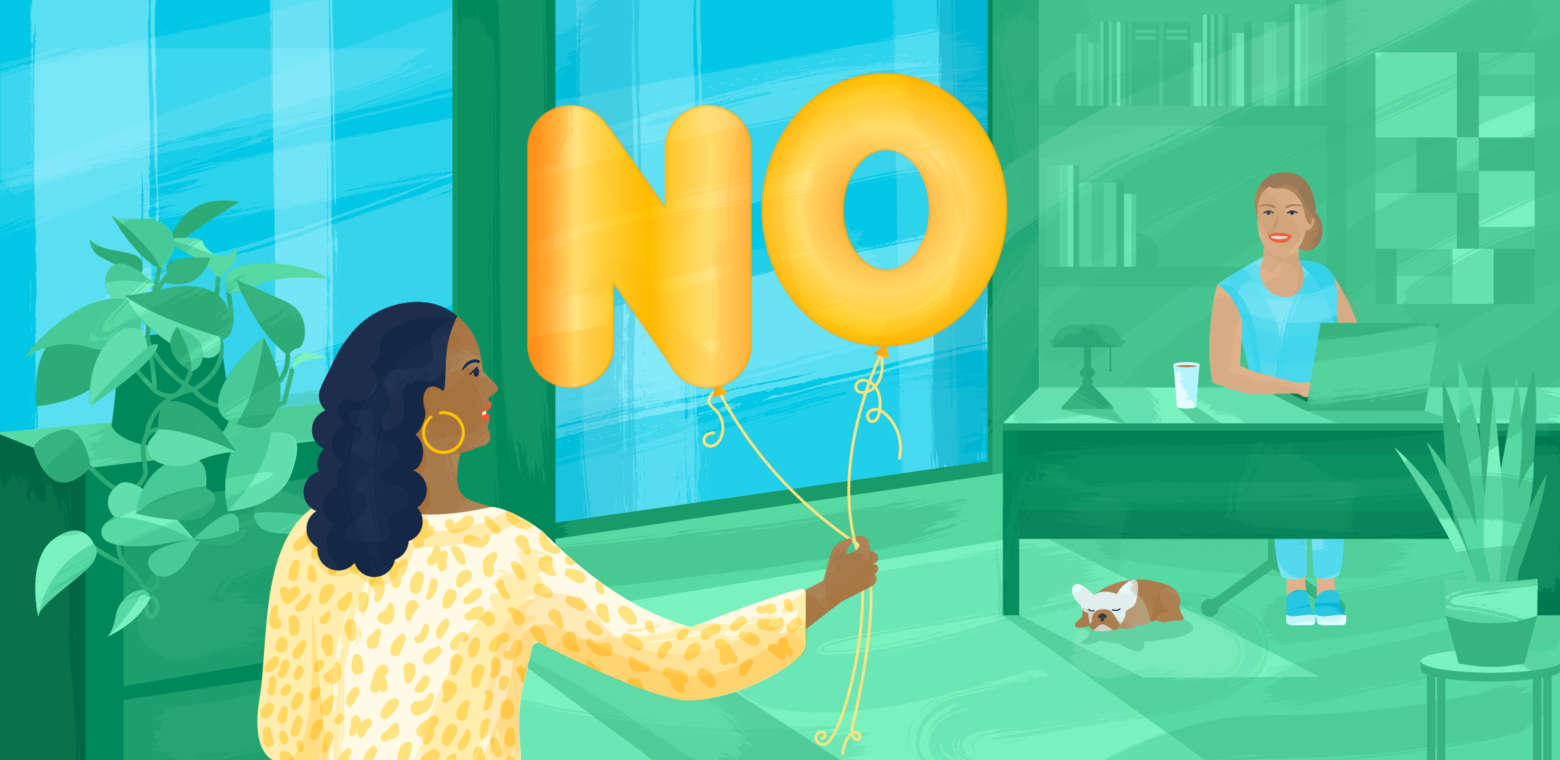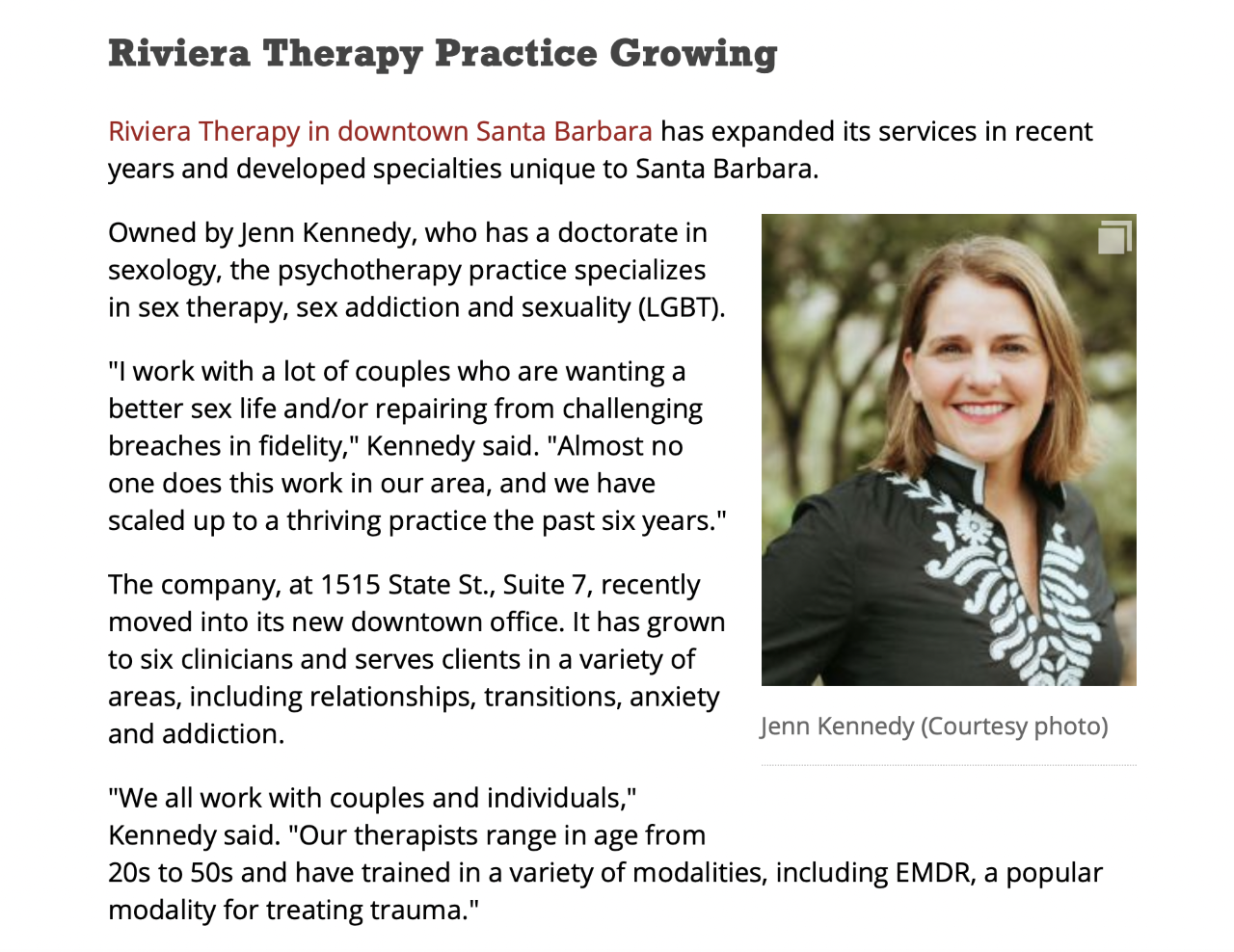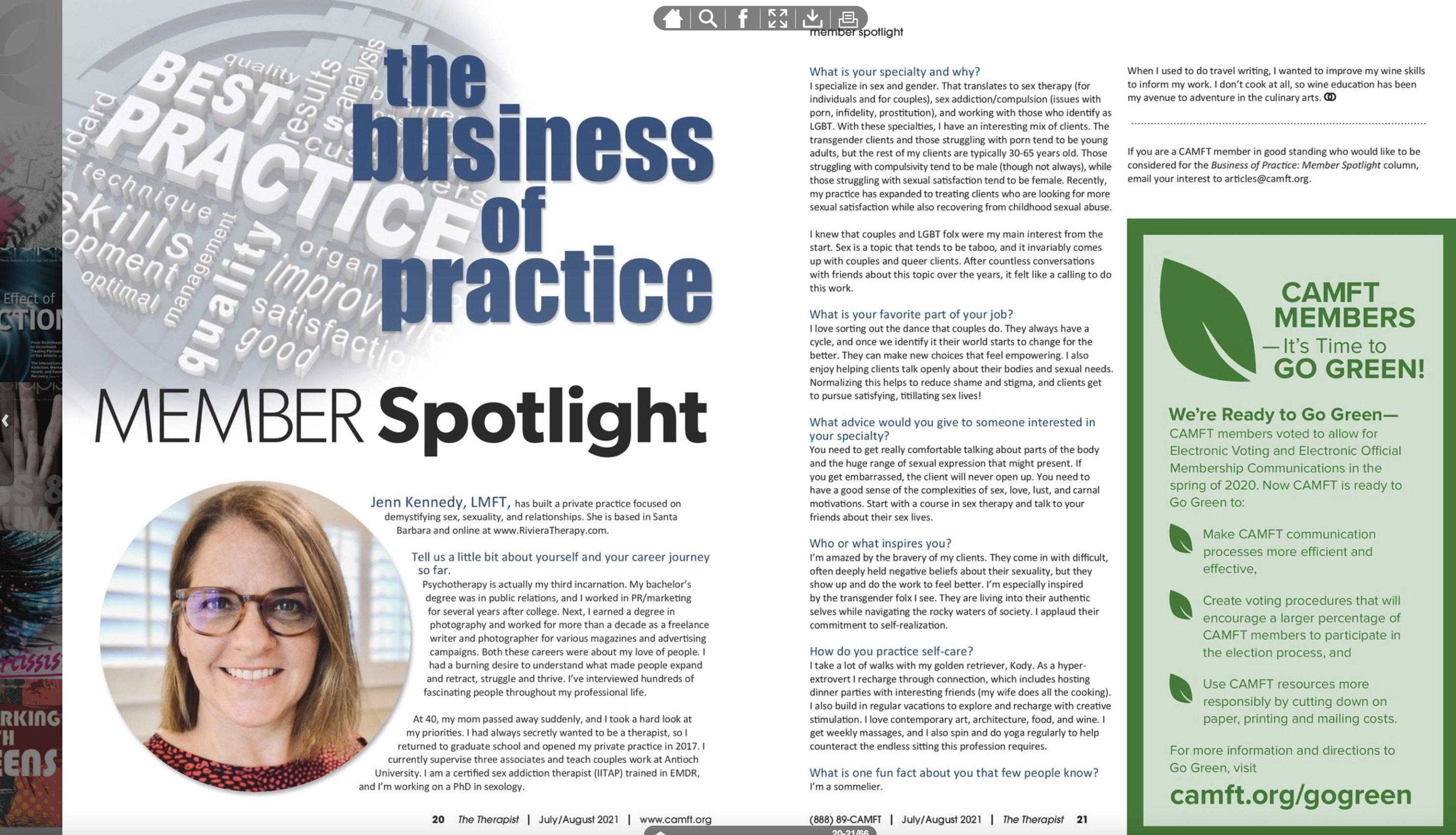Press/Media


Small business owners, in the nation and in the region, keep rosy outlook
A new Bank of America study finds that a majority of small and mid-sized business owners have an optimistic outlook about their businesses over the next year.
Among other things, many expect their revenues to increase and plan to expand their businesses, the survey, released May 1, found.
Jenn Kennedy, who has a Santa Barbara psychotherapy practice, is one of them.
“I was happy to see that in the report,” she told the Business Times May 10.
“I’m hopeful too.”
Kennedy, 50, said Riviera Therapy has a stratified business model with different price points.
“And I have seen a general uptick in sessions, with clients being able to tolerate higher price points,” she said.
“So, it seems like it echoes what’s happening according to the report,” she said.
Riviera Therapy was founded in 2017 and now has nine therapists, including herself.
Its focus is on couples relationships and sexuality, but it does serve individual clients as well.
Like many other businesses, Kennedy’s enterprise weathered some challenges during the pandemic.
But the last two years have seen growth, both in number of appointments and income, she said.
“It’s encouraging,” Kennedy said.
So much so that she’s closing escrow on a second building to expand her business.


The Principles of the Pleasure Project
Embarking on a new chapter in life is seldom a seamless transition, yet for Dr. Jenn Kennedy, the journey from a successful career in photography and writing to a thriving psychotherapy practice was a remarkable leap at the age of 40. Driven by a clear vision of assisting couples, Kennedy navigated the rigorous licensing process with unwavering focus and efficiency.
Typically, therapists don’t approach couples’ work with lukewarm sentiments; it’s not for the fainthearted. Working with couples can be fraught with intensity, laden with conflict, and marked by competing agendas. Kennedy, however, has embraced these challenges and cultivated a flourishing practice dedicated to serving couples. Identifying a recurring theme in her clients surrounding their sex lives — she pursued a deeper understanding by earning a Ph.D. in sexology and teaching in the graduate program at Antioch University Santa Barbara.
Armed with a decade of clinical expertise and a robust theoretical foundation, Kennedy has curated tailored content to address the unique needs of both couples and women. The Pleasure Project, launched in January 2023 (pleasureproject.us), encompasses a podcast, blog, and online facilitated small groups. Kennedy, through her podcast, engages with professionals across various fields, delving into topics such as desire at older ages, pelvic floor pain, body image, low libido, and sexual performance anxiety.


FFF Threesome
A FFF threesome is group sex involving three people who identify as female. This type of threesome involves female-female sexual activity between some or all of the participants. It can have several dynamics, such as everyone interacting sexually, one person focusing on two people, two people focusing on one person, or two people interacting sexually while the third person watches them. It is sometimes called an FFF threeway, a lesbian threesome, or a lesbian threeway.
Some people enjoy FFF threesomes for the novelty. This kind of threesome can allow someone to have sex with someone outside their relationship, which can be liberating and shake up the usual routine. Having sex with someone new can also be very exciting for single people.
The novelty of an FFF threesome extends to the thrill of pleasuring and receiving pleasure from more than one person. An FFF threesome can amplify pleasure, as there are more hands and mouths to stimulate the body.
Dr. Jenn Kennedy, PhD, LMFT, who founded Riviera Therapy and The Pleasure Project, adds that “In general, women enjoy sharing, and are very good at mutual enjoyment. They aren’t self-focused or competitive with each other in the same way we see with men. Rather, they value everyone having pleasure, so three women together magnify this dynamic. Women are also incredibly patient. Women typically take longer to reach arousal, so women in combination allow for longer foreplay. Additionally, multiple female partners together build arousal through seeing and hearing the pairing of one another.”
People with voyeuristic tendencies may also enjoy watching other people have sex with one another during an FFF threesome. These people may prefer taking a more passive role in the threesome and allowing the other two participants to pleasure one another while they masturbate or simply watch the action.


7 Relationship Red Flags That Crop Up Over the Holidays and Why You Shouldn’t Ignore Them
For new relationships in particular, it may be tempting to excuse unsettling behavior on the stress of the holidays, but experts agree: A red flag is still a red flag — whether it happens regularly or just every December.
“Red flags are a building narrative of what is likely to happen in the future. If you ignore them, you are setting yourself up for difficulty and disappointment later,” says Jenn Kennedy, PhD, a licensed therapist and founder of Riviera Therapy and The Pleasure Project.


What Is An Empath? Plus 5 Signs You Could Be One
For those who describe themselves as empaths, the experience of expressing and experiencing empathy is more extreme than the average person. “Empaths feel things deeply and are acutely aware of the energy of those around them,” explains Jenn Kennedy, Ph.D., a licensed marriage and family therapist and founder of Riviera Therapy in Santa Barbara, California.
“They sense what others are feeling and may find it difficult to separate their own feelings from others,” says Dr. Kennedy.


Can Love Really Make You Sick?
While lovesickness isn’t an official diagnosis, love, or lost love, can have physical symptoms.
It may sound like the stuff of fairytales and rom-coms, but love and love loss can leave you feeling mentally and physically unwell. If you’ve ever had your heart broken, lost someone you love, or fallen in love with someone who didn’t feel the same way, you may have experienced lovesickness.
“There is a powerful mind-body connection, and when the mind is distraught, the body often reflects with a somatic response,” says Jenn Kennedy, PhD, a marriage and family therapist and sexologist based in Santa Barbara, California.
Feelings of lovesickness can be both mental and physical. There’s no clinical definition, but lovesickness usually represents how the body responds to feelings in the mind. “Typically, relationship challenges produce anxiety, depression, powerlessness, and hopelessness, which can cause physical symptoms: no appetite, fatigue, tightness in chest or stomach, headache, and low mood,” says Kennedy.


How To Overcome Doubt and Build Trust in a Relationship in Just a Few Steps
Someone you know just dropped some news: their marriage is ending. Whether or not you expected it, knowing what to say to someone going through a divorce is tough.
While divorce may carry a negative connotation, it’s still common. Recent data from the Census Bureau indicates that about 30 percent of marriages end in divorce. When people are losing a life partner and going through such a massive breakup, they need the rest of their village to step up.
“What is the hardest part for you?” Dr. Kennedy suggests asking this of a person going through an unexpected divorce and having a tough time with it.
“Responding to the news of divorce can be tricky because it’s likely a complicated, layered situation that isn’t easily captured in a simple comment,” Dr. Kennedy says. This prompt can clue you into what to say next, such as an offer for a specific kind of help.


15 Helpful Phrases To Say To Someone Going Through Divorce
There are many reasons why insecurity arise in a relationship. These feelings might stem from fear—whether of intimacy, rejection, or of losing yourself in a relationship—or past relationship trauma.
Dr. Kennedy adds, “doubts can arise when a partner doesn’t say or do what was expected of them in any number of circumstances, or doubt can creep in when there is a lot of vulnerability on the line—say with an engagement or a request to move in or move to the next step.” The latter of which can go some way to explain when a person might suddenly have doubts about a new relationship. “Those big moments are scary and uncertain growth times can lead to fear and doubt, which is likely to resolve with more information and experiences together,” she says.


How the ‘Shadow Work’ TikTok Trend Can Help Your Mental Health
The word “shadow” can be used metaphorically to describe someone who follows you everywhere, such as a toddler almost attached to the hip of a beloved parent. Or, you may hear the term used when discussing someone who overshadows another — a sibling or colleague whose achievements may outshine another’s.
But do we have a shadow other than the literal one that presents when the light hits us just so?
That’s the idea behind shadow work, trending on TikTok with videos hitting 2.1 billion views and counting.
“Shadow work is turning toward the harder, often disowned parts of ourselves,” explained Jenn Kennedy, Ph.D., LMFT, founder of Riviera Therapy and The Pleasure Project. “It’s allowing complicated, typically avoided, and unconscious parts of you to emerge and be processed.”


The #1 Thing To Say to Someone Who’s Going Through a Breakup—Plus, What *Not* To Say
Breaking up is hard to do. Whether someone chooses to break up with their partner or they’re blindsided after being dumped, suddenly becoming single can be a difficult life change. And as a friend to a newly single individual, it can be tricky to know what to say to someone going through a breakup.
It’s true—there’s no bereavement leave for someone with a broken heart. Support may come in the form of family and friends to lean on. However, it can be challenging for loved ones to find the right words to help someone going through a bad breakup.
It’s not your job to mend a broken heart with words. However, what you say to a person going through the romance ringer still carries weight during an already heavy time.
“Finding the right words matters because your friend is sensitive and vulnerable,” says Dr. Jenn Kennedy, Ph.D., LMFT, the founder of Riviera Therapy and The Pleasure Project. “They need signaling that they are known and valued by you.”


This Is the #1 Early Depression Sign Most People Miss
It’s normal to feel sad sometimes, particularly as a reaction to a specific life event, like not getting a job you applied for or a friend moving away. But while sadness is an emotion that is short-lived, depression is a diagnosable mood disorder that is so intense that it impacts one’s daily life.
Dr. Jenn Kennedy, PhD, LMFT, founder of The Pleasure Project and Riviera Therapy, says that the number one early sign of depression is a change in mood or energy level. For example, someone may find themself feeling more tired and lethargic than usual. Or, she says, someone may find themselves becoming more irritable than they typically are. When depression starts to creep in, a minor offense can suddenly seem like a big deal. For example, if a stranger accidentally bumps into you, it could fill you with rage, whereas normally, you would just brush it off.


We All Have a Shadow Self—Here’s How to Embrace Yours
A ‘shadow self’ sounds like a creepy monster hiding in our closet. In reality, though, it’s a term coined by psychiatrist and psychoanalyst Carl Jung to describe the parts of ourselves we wish to repress or hide. But rather than denying the existence of some of these supposedly negative traits, there’s a case to be made for confronting them in a practice called shadow work, which could help us better understand ourselves and our relationships, and better manage negative feelings and impulses. Here’s what you need to know about your shadow self, why you should embrace it and how to begin to do that, according to therapist Dr. Jenn Kennedy.
Kennedy tells us, “Shadow work builds tolerance and self-acceptance for parts we dislike. This type of integration of self brings understanding and self-love. It also helps create greater ability to differentiate shadow work as an exercise in play.” By that she means someone could fantasize about how they’d handle a scenario or imagine taking action without actually going through with it and causing chaos or disharmony. “This exercise gives them an outlet while protecting their health and well-being and/or without impact to their relationships. They can explore without actualizing.”


Trauma Dumping: Signs, Effects And Strategies For Overcoming It
Having strong social connections is essential—they’re associated with better physical and mental health, and even longer life expectancy. Supportive relationships make it easier to cope when life throws challenges our way.
While talking out difficulties with a trusted friend can help with coping, sometimes, sharing trauma with a confidant can possibly lead to what is colloquially known as trauma dumping—and it can have a range of effects on the receiver’s mental health.
Trauma dumping doesn’t facilitate healing, adds Jenn Kennedy, Ph.D., a licensed marriage and family therapist and founder of Riviera Therapy in Santa Barbara, California. “While it may provide short-term relief to the person doing it, ultimately, it doesn’t help either party and leaves the listener feeling burdened and helpless,” she says.


How Quickly Can You Get Back to Sex After a Heart Attack?
If you’ve experienced a heart attack or a blood clot or you live with arrhythmia—an irregular heartbeat—you’ll know how scary the experience can be.
These heart conditions are known as cardiac events. Whether you’ve experienced a cardiac event or required a surgical procedure, your healthcare provider may refer you to a cardiac rehabilitation program in order to strengthen and heal your heart.
Cardiac rehab provides other health benefits, too, such as improved endurance, healthier habits and an increased overall energy level. According to the Centers for Disease Control and Prevention (CDC), it can help you renew sexual activity and intimate relationships, and address fears you may have about sex following a cardiac event.
A 2018 study suggested cardiac rehab can even have a positive effect on your sex life.
“You might be feeling anxious about increasing your heart rate for fear of bringing on another heart attack,” said Jenn Kennedy, Ph.D., L.M.F.T., the founder of the Pleasure Project and Riviera Therapy in Santa Barbara, California. “You might also be feeling more weak, tired, and potentially depressed after a cardiac event and all the care that came after it.”
Cardiac rehab can help give you confidence by helping you improve your physical health and strengthening your heart.


Can a Sleep Divorce Help Save Your Relationship? Experts Explain the Pros and Cons
Though the term conveys a breakup, a sleep divorce is not an actual divorce where a marriage is dissolved. In a sleep divorce, you remain together as a couple. You live together as a couple. You’re physically intimate as a couple. But you acknowledge that your relationship may be better off by not sharing a bed together every night.
At the core of it, a sleep divorce is merely “sleeping apart for the sake of getting good sleep,” Alex Dimitriu, MD, founder of Menlo Park Psychiatry & Sleep Medicine, tells DailyOM. “In some instances, [a sleep divorce] might just mean getting a larger bed and sleeping further apart, and in more extreme instances it might mean sleeping in separate rooms.”
If the latter option is what is most appealing to you, don’t fret. It’s not necessarily a sign that the relationship is losing its luster.
In some cases, a sleep divorce might even be necessary to keep an actual breakup from happening, says Jenn Kennedy, PhD, a licensed marriage and family therapist based in Santa Barbara, California.
“Sleeping apart may initially feel upsetting and threatening to the relationship, but it can actually be a solid solution to save the partnership,” Dr. Kennedy tells DailyOM. “It’s time to consider a sleep divorce when resentment starts setting in or when one partner is consistently getting up to move beds because they cannot sleep.”


21 Best Sex Toys for Women for All-Over Pleasure (Whenever, Wherever)
Whether this is your first time buying a sex toy or you’re looking for something new to spice up bedroom play, treat yourself to powerful vibrations and stimulation — courtesy of the best body-safe devices on the market.
No one knows your body like you do, but even you might want to experiment with what you like. We’ve rounded up some of the best sex toys for women, from cult-favorite wand vibrators (Magic Wand, IYKYK) to glass dildos that look like a work of art. We’ve scoured the internet’s best sex toy shops for clit-sucking vibrators, rabbit vibrators, anal toys, whisper-quiet vibrators, and the all-around best adult sex toys. Whether you’re looking to upgrade your masturbation routine, incorporate toys into partnered sex, or generally upgrade your sex life, there’s something here for you.


How Do TikTok’s ‘Delusionships’ Tap Into the Issue of Unrequited Love?
In some cases, a delusionship can refer to a relationship that isn’t rooted in reality at all. It describes “a dynamic where one partner is literally deluding themself about the status of the relationship,” said Jenn Kennedy, Ph.D., a licensed marriage and family therapist and the founder of the Pleasure Project and Riviera Therapy in Santa Barbara, California.
“They typically think the relationship is more important or the other person is more committed than what is actually happening,” Kennedy said.
It’s not just a case of your brain on hot people acting up.


Here’s why being lazy can be a good thing, according to science
Turns out, being lazy can be a good thing. Although it may feel counterintuitive to slow down and take a step back from your usual grind, science shows there are many physical, mental and emotional benefits to letting go of structure and routine from time to time.
Jenn Kennedy, a Santa Barbara-based licensed marriage and family therapist and founder of the Pleasure Project, tells Yahoo Life that these findings are sound when compared to her clinical experience.
“Clients who engage in these activities (yoga, meditation, tai chi, qigong, breath work, prayer) present as more centered and regulated,” she notes, adding that she’s seen “amazing results” when it comes to treating depression and anxiety. “They also tend to be less defensive and more hopeful. They develop breath muscle memory that seems more accessible during stressful situations, and they are able to calm themselves when faced with difficulty or frustration. They also sleep better, which likely helps with blood pressure, heart health and anxiety.”

‘The Sex and the City’ Gals Are Still Teaching Audiences About Kegels
Strengthening the pelvic floor muscles benefits more than just sexual pleasure—for men, too.
“They help strengthen the pelvic floor, which plays a big role in sexual health and vitality,” said Jenn Kennedy, Ph.D., L.M.F.T., a sexologist and the founder of The Pleasure Project and Riviera Therapy, in Santa Barbara, California. “In addition to sexual performance, a strong pelvic floor can also help with issues around urinary or fecal incontinence.”


How To Increase Libido: 7 Ways To Boost Sex Drive
It’s normal for your sex drive to ebb and flow over time, but if you’re never in the mood for sex, you might be wondering what you can do about it. Just as there are many reasons behind why people may experience low libido—from aging and fluctuating hormone levels to chronic stress—there are a number of ways to improve your sex drive.
One small study of heterosexual women found a link between body dissatisfaction and impaired sexual desire. Exercise is also helpful for low desire that is rooted in body image, says Jenn Kennedy, Ph.D., a board-certified sex therapist and founder of The Pleasure Project and Riviera Therapy in Santa Barbara, California. That’s because movement helps elevate mood, which can help with desire, she says.
Seeking support for low libido is never a bad idea, says Dr. Kennedy. A medical health care provider can screen for biological issues involving blood pressure, thyroid and hormones, she says. And whether the cause is medical, a sex therapist can help unpack issues including when low sex drive happens, whether there’s been a shift in functioning and interventions to address it, says Dr. Kennedy.


What to Say to Someone Who is Sick
Things to avoid saying to someone who is sick: Dr. Jenn Kennedy says if you say something that doesn’t land right, have grace with yourself and try again. She recommends avoiding sentences that start with “at least” because it may feel like you are trying to find the good in the situation, which can feel agitating.
You also want to avoid making comparisons even if you’ve experienced a similar illness or circumstance. “It doesn’t mean that the experience is the same,” Maidenberg says. “It shuts down communication. And if a person is having some kind of varied experience, they’re not going to want to share.”
“… If you are reaching out to a coworker and your relationship is purely business, you want to be encouraging without prying, as they may not want coworkers to know the nature of their recovery,” says Jenn Kennedy, a marriage and family therapist and a professor at Antioch University in Santa Barbara.
Cards: Cards can be a good option for almost anyone in your life, especially those who are dealing with a long-term illness. They are a passive way to let someone know that you care, and sending one gives you the chance to write a heartfelt message.
Phone calls: A phone call can be more invasive, so reserve that for someone you have a closer relationship with. “Don’t expect them to answer, but rather, be prepared to leave a kind, concise message that shows you care,” Kennedy says.
Texts: Text messages are good for quick updates or short-form messages — especially for close friends and family members — but they can also put pressure the person to respond and talk about their condition, even if they aren’t ready to do so.
If you’re going to send a text, make sure to say something like, “I’m just letting you know that I’m thinking of you. But I also want to let you know that you don’t need to respond to me if you’re not up to it.”


How Losing a Loved One Exacerbates Mental Health Issues
Last week, “Euphoria” breakout star Angus Cloud died at 25. The cause of the actor’s death is still unknown.
“Angus was open about his battle with mental health, and we hope that his passing can be a reminder to others that they are not alone and should not fight this on their own in silence,” the family’s statement said…
Jenn Kennedy, PhD, LMFT, founder of Riviera Therapy and The Pleasure Project, said that the death of a loved one could cause intense feelings of existential angst.
The finality of death can feel unsettling and frightening, and many people feel helpless or powerless.
“Survivors question their value, life choices, longevity, and purpose,” she said…
For those already struggling with their mental health, the death can make their condition — specifically, any issues with their self-esteem, depression, anxiety, and past trauma — feel paralyzing, she added.
Experiencing the death of a loved one — and the loss of structure that accompanies it — can exacerbate pre-existing mental health issues or trigger the development of new issues.


Fleur du Mal: A Beginner’s Guide To Sex Toys
When it comes to the most familiar and popular variety of in-bedroom devices – that would be vibrators, duh – you don’t have to go to any extremes in order to achieve an extreme orgasm.
“Sex toys don’t have to be used internally,” adds Dr. Jenn. “I would suggest starting with an external vibrator. It could be something that fits in the palm of your hand and gives good clitoral stimulation. Vibrators used on the clitoris can be a delightful awakening for women wanting orgasms.”


The three feelings that mean you need to learn how to say “No”.
Saying no when you realize it is the best choice for your health and wellness is, in the world of therapy, also a way of establishing personal boundaries. And learning how to set boundaries is one of the best things you can do, experts tell Inverse. In this article, three therapists give guidance on:
- The first step to take when you want to establish boundaries.
- What to do if you feel guilty about telling friends or family “no.”
- The best way to tell someone “no” without hurting their feelings.
But first, a bonus question: Is learning how to say no generally a healthy thing?
The answer is a resounding yes.


Porn-induced Erectile Dysfunction – Can Porn Cause ED?
Many researchers and sex therapists believe that watching too much porn can cause ED, or at least contribute to erectile problems. ‘Porn-induced Erectile Dysfunction’ (PIED) is the label used to describe this sexual dysfunction. Other medical and mental health professionals believe that watching porn does not cause ED directly. Feelings of guilt or shame, performance anxiety (developed due to unrealistic expectations) or sexual exhaustion are often blamed for ED.
In both cases, if you’re suffering from ED and you fear that it might be related to excessive porn use, there are things that you can do to treat your ED.
In this comprehensive article, we’ll give you an overview of the possible connection between porn and erectile dysfunction, before discussing treatment options for erectile dysfunction.


Riviera Therapy Practice Growing
Riviera Therapy in downtown Santa Barbara has expanded its services in recent years and developed specialties unique to Santa Barbara.
Owned by Jenn Kennedy, who has a doctorate in sexology, the psychotherapy practice specialized in sex therapy, sex addiction and sexuality (LGBT).
“I work with a lot of couple who are wanting a better sex life and/or repairing from challenging breaches in fidelity,” Kennedy said. “Almost no one does this work in our area, and we have scaled up to a thriving practice the past six years.”
The company, at 1515 State St., Suite 7, recently moved to its new downtown office. it has grown to six clinicians and serves clients in a variety of areas, including relationships, transitions, anxiety and addiction.
“We all work with couples and individuals,” Kennedy said. “Our therapists range in age from 20s to 50s and have trained in a variety of modalities, including EMDR, a popular modality for treating trauma.”


Mental Health During the Holidays
The Indy is the Santa Barbara Independent’s podcast, hosted by Molly McAnany. On this week’s episode, we speak with Jenn Kennedy of Riviera Therapy about what you can do to de-stress this holiday season and how to cope with heightened mental-health issues.


The Business of Practice
MEMBER Spotlight
Jenn Kennedy, LMFT, has built a private practice focused on demystifying sex, sexuality, and relationships. She is based in Santa Barbara and online at www.RivieraTherapy.com.

Listen as Karen Pulver and her featured Goddesses speak candidly with sex/gender therapist Jen Kennedy about all these issues, including the danger of the all popular “gender reveal” and how perhaps parents can open their consciousness for “let’s let the individual decide their gender when they grow up.”


“Women in general are just more conditioned to capture the overflow. When there’s new stuff that pops up, there’s oftentimes an expectation that she can absorb it,” says Jenn Kennedy, a marriage and family therapist who focuses on couples.


“If boundaries are in place and honored, then it frees people up psychologically to be more open and curious,” said Jenn Kennedy, a marriage and family therapist based in Santa Barbara.


Jenn Kennedy is a marriage and family counselor based in California, and she says that she’s seen clients run the gamut between tons of contact and none. “I think initially people hesitated to even consider dating,” Kennedy says. “It’s all about risk tolerance and, initially, some people didn’t worry, and others really pulled back. What has been so difficult at this point, though, has been the prolonged nature of the pandemic. I have a handful of clients who are so lonely, and their touch needs haven’t been met, their social needs haven’t been met in 11 months.”


“Healthy boundaries should feel like a sense of agency in the person setting them,” Kennedy says. “There is confidence, there is clarity, there is directness, those are in services of safety, self-respect, and respect of others. Setting a boundary is about your own agency.”


“Toxic is a relational term of how someone affects another. Toxic people will leave you feeling bad: edgy, guilty, confused, frustrated, overextended. They lack boundaries and ask too much from you, so you leave exchanges feeling violated and exhausted. They make assumptions, expect too much, disregard your ‘no’ answers,” Kennedy says.


“In fact, picking a fight may even feel good,” says Jenn Kennedy, a marriage and family therapist in Santa Barbara, California. Some people may even use jealousy as proof of their love, but that quickly wears thin. “Typically jealousy slides into insecurity, defensiveness, and mistrust. Calming down jealousy is difficult and the longer it lasts, the more it hurts the relationship,” she explains.


“Boundaries give a sense of agency over one’s physical space, body, and feelings,” says Jenn Kennedy, a licensed marriage and family therapist. “We all have limits, and boundaries communicate that line.”


So, how do we recognize when we are engaging in these less apparent types of people-pleasing behaviors? Jenn Kennedy, LMFT suggests asking yourself the following questions: “Did you say yes when you really wanted to say no? Did you quiet your voice because it didn’t please or echo someone else who you deem important? Does it seem like you are overextending?” “If so,” she says, “try pushing back on these habits and see what comes of it.”


“People in relationships are constantly asking themselves, in one way or another, if they can trust the other person. Can they show their flaws, or risk being embarrassed? The way to move past this fear is to take measured risks,” says licensed marriage and family therapist, Jenn Kennedy.


“Setting a boundary is about having your own agency,” Kennedy says. “Healthy boundaries should be assertive, but not aggressive. They are clear and concise, and it’s an expression of the idea that there is a desire to have things a certain way. You are saying, this is what I need for my bubble.”


Jenn entertains her readers with her dynamic career and how it has ultimately led her to her “third incarnation” as a psychotherapist. Within her clinical capacity, she also shines as a savvy business owner as well as a supervisor. She shares how her experience as a teaching faculty at Antioch helps inform the depth of her clinical work as well as balancing it out.


“My “unhealthy” alarm goes off when someone reports negative self-talk after interacting with family members. They may return to past beliefs that they are somehow flawed, unloveable or even “broken.” That crosses the line to unhealthy, whereas difficult looks like you feeling annoyed or having to tread carefully.”


“You know a relationship is in trouble when contempt shows up in the couple’s communication, marriage and family therapist, Jenn Kennedy, tells Bustle. That’s when you make little digs or passive aggresive comments to each other. You may not personally see it as a huge deal or you may even write it off as “just a joke,” but you never know how hurtful those comments can be to your partner.”


A more professional rendition of the ever-popular: treat yourself. “Across the board, the one thing that seems to make the most difference is self-care,” says Marriage and Family Therapist Jenn Kennedy.


Gwyenth Paltrow’s Goop.com made the term Conscious Uncoupling a household name in recent years. Coined by Katherine Woodward Thomas, the term has come to describe a civil and intentioned approach, adopted by couples, who have decided to break up. Hallmark signs of conscious uncoupling include mutuality, reason and acceptance.


Just because you get along well with someone’s relatives (and maybe like them even better than your own) isn’t a reason to stay with them and avoid a breakup. “You are partnered with the person and therefore your daily life is with them—not their family,” says Jenn Kennedy, a licensed Marriage and Family Therapist located in Santa Barbara, CA.


Recently I saw a couple who perfectly illustrated a common quandary. Both individuals lead busy lives. They are doing their best to juggle the everyday demands of life—a particularly hectic work patch for one, family stressors coupled with financial worry for the other. Each is somewhat consumed with their respective stressors.
